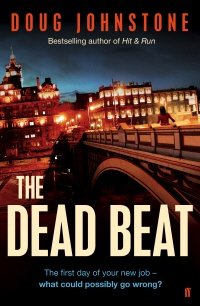With a story that features suicide, clinical depression and the struggling newspaper industry in Edinburgh, The Dead Beat might sound like a gloomy read. It’s certainly a hard-hitting psychological thriller, though its 90s grunge soundtrack and troubled, headstrong protagonist give the novel an angsty energy and bleak humour.
We first meet journalism student Martha Fluke at the graveside of her father, Ian, who recently committed suicide at the age of 44 by jumping off the North Bridge onto Waverley Station. He was a news editor at Edinburgh newspaper The Standard, where she is off to do work experience. Although she never really knew him, there’s a sense of her joining the family trade.
When she arrives at the paper and sees the threadbare operation, Martha soon realises that journalism is going to be a tough career, though it also means there are opportunities for an intern willing to work free. Of course, crime and journalism can often be a good fit in an urban thriller and Johnstone’s good at capturing the palpable sense of decline in printed newspapers.
Martha’s soon given an assignment on the obituaries desk – the Dead Beat of the title – where she works alongside mouthy American Virginia, known as V, who spends her spare time training for bouts in female wrestling contests. The intern also meets Billy Blackmore, a reporter demoted to the family notices page after an incident involving a local crime lord that made the news. If that sounds familiar, it’s because Billy’s story formed the basis of Johnstone’s 2012 novel Hit and Run. Billy is also heavily involved in this novel as he joins Martha on a frantic race around in Edinburgh, partly to pursue a story and also to investigate her family’s past which has a connection to a sequence of shocking events.
Within an hour of her new job, Martha answers the phone expecting the grieving relative of a recently deceased local who might be worthy of a write-up. Instead, she’s speaking to Gordon Harris, the obituaries editor who’s on sick leave for depression. He seems to be in a distressed state – and then it becomes clear he’s dictating his own obituary. Suddenly, she hears a shot.
Following this unpromising start to her career, Martha discovers Gordon knew her father in the early 90s when grunge was at its height. Johnstone has a feel for this musical era and introduces chapters narrated by Martha’s mother, Elaine, as she attends gigs with Ian in Edinburgh. Bands including Soundgarden, Screaming Trees and Afghan Whigs make an appearance and there’s even a cameo from Kurt Cobain. As Martha listens to her dad’s old tapes on an ancient Walkman and reads through his notebooks, she gets closer to the sins of the father – and the mother.
The Dead Beat is a concise novel, so it wouldn’t be fair to give away too much of its plot. With his staccato prose style, Johnstone is good at creating atmosphere but his story is a bit thin and the ultimate revelation is fatally obvious. It’s also undermined by a final confrontation where the police presence is lackadaisical in the extreme. An author like Ken Bruen can get away with focusing on atmosphere over plot by creating a noirish quality that depends less on twists and turns. But with Johnstone’s book, the absence of serious plot development hampers your belief in the story.
At least Johnstone’s characters are intriguing. Martha is opinionated, resourceful and capably dealing with her depression by electing to receive electroconvulsive therapy (ECT), which is described with an accuracy that demolishes any clichés associated with the treatment without making it any less disturbing. The Dead Beat has some original ideas and it makes for an enjoyable afternoon’s reading. It’s a shame, however, that its strong characters never take over what is a rather pedestrian story.
Faber & Faber
Print/Kindle/iBook
£4.74
CFL Rating: 3 Stars










